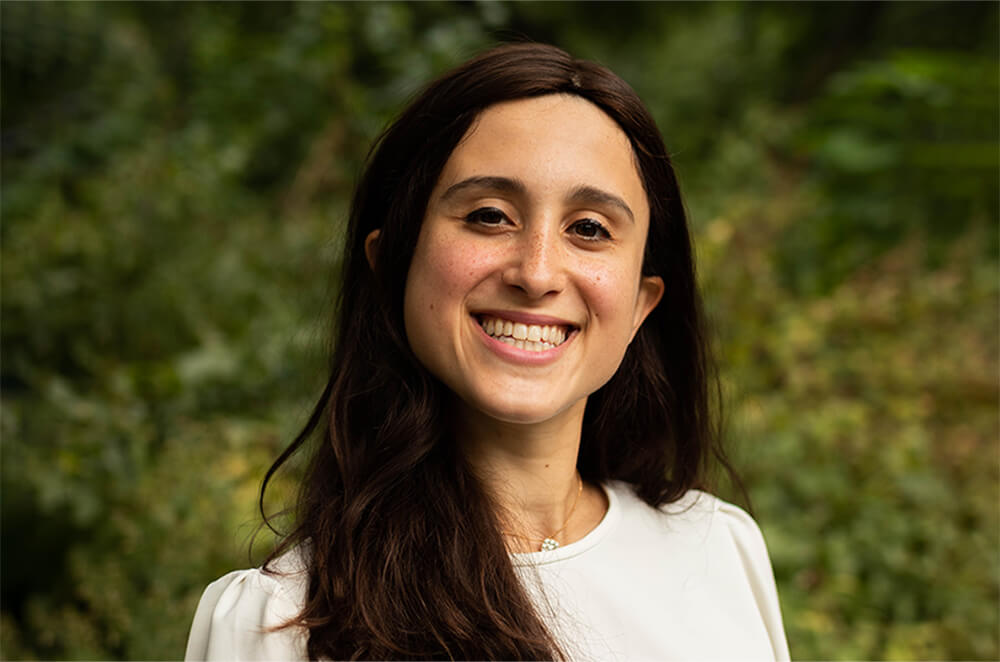For a Mother of Three Young Children, Now is the Perfect Time to Earn Her PhD
Mushka Steinmetz Searches for Jewish Creativity and Culture in the Modern World at Touro's Graduate School of Jewish Studies

Mushka Steinmetz couldn’t decide on a topic for her master’s thesis at Touro University’s Graduate School of Jewish Studies (GSJS), but there was one element that she knew she was not interested in exploring: tragedy.
“When we talk about Jewish history, we always focus on catastrophes, but I didn’t want to focus on a catastrophe,” she said. “I wanted to focus on Jewish creativity, on its own terms, and not in the context of what’s going on in the world and what our relations are with everyone else.”
She held firm on that requirement, eventually settling on analyzing a 17th century commentary on rabbinic texts in the context of contemporary Polish Jewish thought, and the results strongly suggest she made the right call. Not only was she chosen to be student speaker at last year’s commencement exercises, but at the urging of GSJS Dean Emeritus Dr. Michael Shmidman, she decided to continue her research at GSJS, this time working toward a doctorate.
“Dr. Shmidman kept mentioning it, but even though I was enjoying researching this subject immensely, I wasn’t sure it was going to work out,” Mushka said, as she had given birth to a baby, her third, before completing her master’s thesis. “Dr. Shmidman was incredible. His being so considerate of my situation enabled me to submit my thesis on time.”
Mushka’s faculty advisor was GSJS professor Dr. Shlomo Zuckier, and her area of focus was early-modern interpretations of the Aggadah (the non-legal portions of Rabbinic literature).
“I like the early-modern period,” she said. “There was so much going on in the world, including the scientific revolution and proliferation of new ideas. The early-modern mapping of new ideas onto the canonical Aggadah is a fantastic window into the rabbinic intellectual history in those days.”
For her thesis, Mushka worked on the writings of Rabbi Elyakim Getz, a little-known 17th-century scholar, who noticed that Jewish people were ridiculing the apocryphal stories related by Talmudic scholars, even as they respected the laws, or halachot, that accompany the stories. Getz took it upon himself to defend the rabbis, Mushka said, writing a book, Rappduni Batapuchim (“Refresh Me With Apples,” a phrase which comes from Song of Songs, chapter 2, verse 5), that argued the stories of the Talmud contain deep messages meant to impart moralistic messages, but not necessarily be taken literally. By analyzing Getz’s interpretive methods, Mushka found that Getz used his commentary to defend not only the Talmudic sages but also his contemporary impoverished rabbis, whom he felt were not adequately respected by the laymen.
Given her interest in Jewish intellectual history during that time period, Dr. Shmidman arranged for Mushka to meet with former GSJS professor Carmi Horowitz, who specializes in medieval Jewish thought, and has a special interest in Aggadic commentary.
“Professor Horowitz suggested this topic,” she said. “I hadn’t known about Getz’s book before that.”
As a mother of three “very little” children, Mushka decided to enroll in the doctoral program because she wanted to continue her Jewish learning, and the stipend provided to her by the graduate program enabled her to do that and stay home with her kids, rather than return to her job as a teacher. But eventually she’d like to go back to the classroom—with even more impressive credentials once she’s earned her doctorate.
“I enjoy teaching, and I hope to return to it in some capacity, and hopefully my degree will augment that,” she said.
In the meantime, Mushka is just enjoying this unexpected journey.
“You know, I never planned to do this. I never dreamed of being a historian,” she said. “It wasn’t something I ever thought about, so this is a really fortunate turn of events.”

